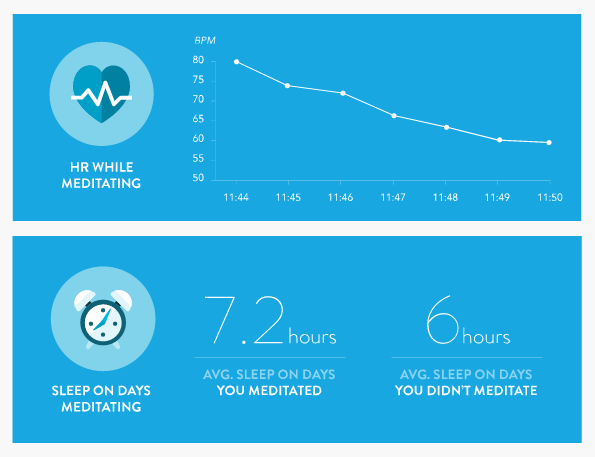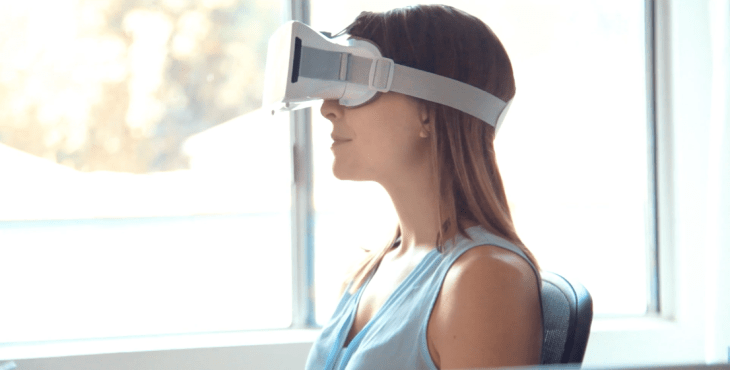What’s the point of virtual reality? At this nascent stage the question remains hanging in the pixelated air like the promise of a better life off-world. As does the associated unknown of whether the tech’s promise of “exceptional immersion” will stand the test of time and make the leap to mainstream appeal.
For now, on the content side, VR mainly means a few gaming experiences with relatively niche appeal (given the pro kit needed to power them), and experimental or quasi-educational content such as virtual tours, medical therapy and attempts to foster empathy by embodying another first-person perspective. But another idea is to use VR to foster mindfulness by tuning out the day-to-day and tuning into some calming VR vistas.
U.S. digital health company Provata Health is one of several companies hoping to harness the technology’s power as an escapist medium by using it as a backdrop for guided meditations — and has just launched a VR iOS app.
The idea being you slip on a mobile VR headset and use the app to experience a guided meditation within a 360-degree calming visual environment, such as sitting on a beach or next to a waterfall. (Although Provata’s app can also be used for guided meditations without needing to put on an iPhone-compatible VR headset — just with the same peaceful landscape to swipe around onscreen.)
Also incorporated into its app: the ability to link health-tracking wearables, such as the Apple Watch, to quantify the effects of a meditation session on, for example, your resting heart rate. Or look at how your sleep is being affected by taking time out to meditate. The company says the app can also be used to track pre- and post-meditation heart rate using just a smartphone camera — for those who don’t own a fitness wearable.

There’s an increasing number of apps and digital services focusing on the mindfulness space — including the likes of Headspace, Calm and Simple Habit. Even Apple has a relaxation app for its Watch wearable, called Breathe. Provata also has a wider digital health play — selling guided programs via employers wanting to offer staff encouragement to take up health-boosting activities — but the VR app is its first step into the consumer mindfulness space. CEO Alex Goldberg says it’s hoping to “pioneer a new category of digital health: Virtual Reality Preventive Care.”
“We create all the guided meditations ourselves,” he tells TechCrunch. “At the beginning of each meditation, the user is asked to look around to help them find a spot to relax to calm their mind before settling in on an ideal view for performing your meditation. We want users to experiment with different orientations within each immersive environment. Certain meditations reference the physical surroundings more than other meditations.”
Goldberg says Provata’s existing wellness programs, which include content focused on encouraging fitness and helping people improve their nutrition, have been tested through NIH- and CDC-funded clinical trials. But the new VR meditation app is, at this point, untested in efficacy — much like the rest of the VR category.
“We plan to conduct a peer-reviewed study on this, especially now that we have meditation biofeedback integrated into the app, letting users track their heart rate pre and post meditation,” says Goldberg. “The study will be looking at comparative heart rate trends as well as reported stress and depression scores among users.
“The peer-reviewed study of our digital health program, (Healthy Team Healthy U), became the first digital health program proven to positively impact both the mental health and physical health of participants… One of the reasons why we were able to reduce depression and stress is because the program integrates — and for most of our participants, introduces them — to guided meditation exercises as a strategy to improve their mental health. The study found reductions in stress scores and depression scores (using a 7-point Likert scale), particularly among those participants reporting high levels of workplace stress prior to the program.
“We see Provata VR as an opportunity to broaden awareness and utilization of guided meditation to enhance these outcomes among a wider audience.”
Whether there’s any contradiction in the notion of focusing on your own mind as an anti-stress strategy and means to increase calmness/achieve greater self-awareness versus relying on a VR headset to artificially induce a feeling of tranquility is up for debate. It’s safe to say, VR meditation is not going to be for everybody — but perhaps it might offer a route into a stress-relieving activity for people who otherwise might struggle to tune out their daily life without the help of a prop.
Meditations in the app are “purposefully short,” says Goldberg, with two-, five-, and 10-minute options — as one way to avoid people spending too much time sucked into VR (which can itself have negative physiological effects, such as nausea or, in my own experience, eye strain), and also because he claims even a few minutes of meditation per day has been found to produce beneficial effects in “numerous studies.”
“We haven’t had any reports of negative psychological effects. We also think the high quality 4K videos help,” he adds.
While the app is a free download and offers some content without needing to pay, there is also a subscription service — costing $3.99 per month or $35.99 per year — for access to more “exotic locations” as a backdrop for meditations.

